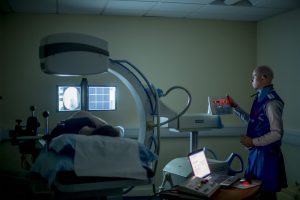Research participants needed!
The Centre for Biomechanics Research (located at the AECC University College, Parkwood Campus) is currently conducting a study investigating low back joint motion patterns in pain free adults. This study has National Research Ethical approval and aims to establish normal spine motion, which will support future investigations into low back pain and its possible treatments.
To collect the required data, pain free volunteers between 30 and 70 years of age are needed who are willing to have their low backs scanned with a method called ‘Quantitative Fluoroscopy’. This will take place in the AECC University College Chiropractic Clinic and takes no more than 1 hour.
Taking part in this study means that you are helping to advance science which will benefit many patients in the future. Additionally, this is an excellent opportunity for healthcare students and staff to learn more about this emerging technology.
Please contact us at cbrstudies@aecc.ac.uk if you are interested in taking part and we will send you more information about this study. We are looking for approximately 100 more volunteers, so we’d like to encourage you to spread this information to family and friends who can also be welcomed as participants.
Kind regards
Alan Breen (Professor of Musculoskeletal Research)
Alex Breen (Post-Doc and Technology Lead)
Emilie Claerbout (Bournemouth University Student)

 See your spine move in real-time motion at the AECC
See your spine move in real-time motion at the AECC Alan Breen: 0.2 FTE Professor of Musculoskeletal Research in the Faculty of Science & Technology
Alan Breen: 0.2 FTE Professor of Musculoskeletal Research in the Faculty of Science & Technology










 Nursing Research REF Impact in Nepal
Nursing Research REF Impact in Nepal Fourth INRC Symposium: From Clinical Applications to Neuro-Inspired Computation
Fourth INRC Symposium: From Clinical Applications to Neuro-Inspired Computation ESRC Festival of Social Science 2025 – Reflecting back and looking ahead to 2026
ESRC Festival of Social Science 2025 – Reflecting back and looking ahead to 2026 3C Event: Research Culture, Community & Cookies – Tuesday 13 January 10-11am
3C Event: Research Culture, Community & Cookies – Tuesday 13 January 10-11am Dr. Chloe Casey on Sky News
Dr. Chloe Casey on Sky News ECR Funding Open Call: Research Culture & Community Grant – Application Deadline Friday 12 December
ECR Funding Open Call: Research Culture & Community Grant – Application Deadline Friday 12 December MSCA Postdoctoral Fellowships 2025 Call
MSCA Postdoctoral Fellowships 2025 Call ERC Advanced Grant 2025 Webinar
ERC Advanced Grant 2025 Webinar Horizon Europe Work Programme 2025 Published
Horizon Europe Work Programme 2025 Published Update on UKRO services
Update on UKRO services European research project exploring use of ‘virtual twins’ to better manage metabolic associated fatty liver disease
European research project exploring use of ‘virtual twins’ to better manage metabolic associated fatty liver disease